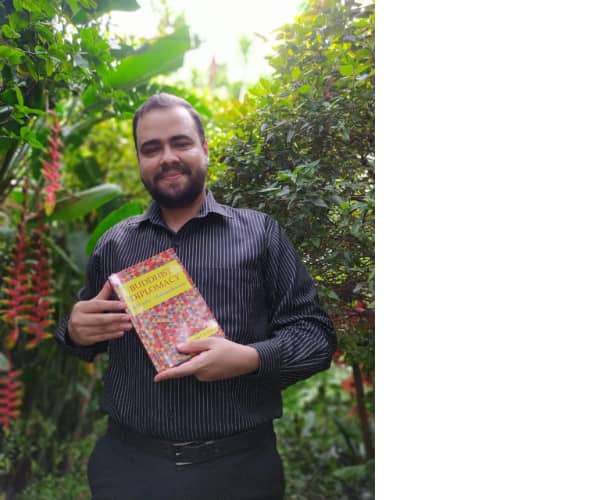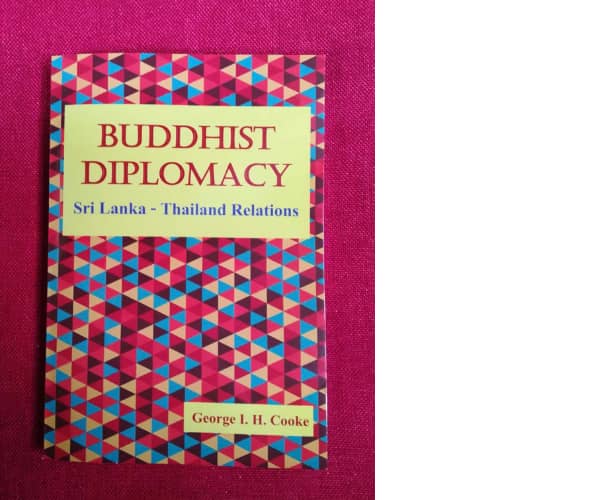
Jun 08 2022.
views 604Today on the buzz I speak to George about his new book which was published yesterday, together with The Royal Thai Embassy and the Awarelogue Initiative.
As a diplomatic historian and former Sri Lankan diplomat, George is the Initiator of the Awarelogue Initiative, a virtual platform for awareness and dialogue in the sphere of International Relations and its related areas. His latest publication, 'Buddhist Diplomacy: Sri Lanka-Thailand Relations' was launched yesterday (07th June) at the Buddhist Cultural Centre, in partnership with the Royal Thai Embassy in Sri Lanka. He speaks about the inspiration for the book and more.

Why and how did you write this book?
I started this research during a short break in my Ph.D. research some years ago. Having always been fascinated by Thailand and quite captivated by their royal family, the more I read the more I realized that there were different sources that looked at varied issues of the bilateral relationship. These were highly significant but not widely discussed in the present day, nor known by some at all. Research for this book was done mainly through secondary sources at the National Archives of Sri Lanka and the Ubon Ratchchatani University in Thailand, where I was awarded a fellowship. Extensive research was also done at the Sri Paramananda Raja Maha Viharaya in Galle which is home to a vast repository of letters and artifacts connected to Thailand.
Why focus on Thailand?
Thailand and Sri Lanka are situated in neighbouring subregions in Asia and are historically linked countries. The interactions between our two countries date back centuries and have been recorded in ancient chronicles which provide insight into a strong relationship. From ancient times, the connectivity has been chiefly based on religious exchanges.
The firm Buddhist ties ensured that both countries nurtured the religion and philosophy of the Buddha, and supported each other throughout the centuries. The most significant developments were the Upasampada ordination ceremonies that took place in ancient Siam by Sri Lankan monks, and thereafter by Thai monks, led by the Venerable Upali Maha Thero, for Sri Lankan monks. This cooperation solidified relations at the highest levels of governance in the two countries.
In 2022, Sri Lanka and Thailand commemorate 67 years of bilateral relations since the establishment of diplomatic ties in 1955. We are on the eve of the 270th anniversary since the founding of the Siam sect in 1753; 240 years since the founding of Bangkok in 1782; 125 years since King Chulalongkorn first visited the island of Ceylon in 1897; and Sri Lanka is on the eve of her 75th anniversary of independence.
These are undoubtedly significant milestones and ones that require due reflection. It is the closeness of our peoples and the cooperation that has taken place from ancient times to the present, that stand as testimony to the connectivity and bonds of friendship between Sri Lanka and Thailand.
How does Thailand promote so much diversity?
Thailand possesses much diversity and is an Asian nation that is rich in culture and has made vast strides in a plethora of spheres. Today the country is playing a leading role in the South East Asian region and is the current chair of the Bay of Bengal Initiative for Multisectoral Technical and Economic Cooperation (BIMSTEC). The secret to the country’s success is the strategic nature of decision-making. Thailand has constantly strategized, from historic times onwards, and has remained a critically important country in this part of the world. Hence this winning formula has enabled the country to remain relevant over the centuries.

Who should read this book?
This book is for anyone who is passionate about Sri Lanka, the path taken by this country, and its potential going forward. It is the same across the Bay of Bengal in Thailand, where it serves the same purpose for the Thai reader, or in fact anyone anywhere in the world, as they discover the importance of religious engagement.
A book of this nature is based on research. Research is a deep understanding of facts, analysis of them, finding varied interpretations, understanding of how history has evolved, and so much more. This book takes a reader on a journey through time. This journey has varied meanings for different people. For the student of International Relations and Buddhist Studies, it opens new areas for research; for the avid historian it enables a deeper understanding of bygone eras; for the enthusiastic reader, it is a new path to identifying key moments and monarchs, and how they shaped relations. However quite importantly, for the policy formulator and decision-maker, it is an initial foray into wider comprehension of the immense potential that exists for diplomatic engagement. Informed decision-making remains crucial, and a clear comprehension of that which has occurred enables and ensures convincing returns.
What are key elements in the book?
The book provides an introduction to some of the landmark incidents in the bilateral relationship and also serves as a guide for further research. It is possible to dive much deeper into each chapter and is only a humble attempt to provide a curated view of the engagement and cooperation between Sri Lanka and Thailand.
The first chapter gives an overview of Buddhist Diplomacy, how it has been practiced, with examples looking at its implementation, and even reflects upon a former UN Secretary-General, who relied heavily on his religious upbringing when examining global issues and tried to follow the philosophy of the Buddha in his work. It also explores contemporary times involving Sri Lankan leaders who engaged in Buddhist Diplomacy.
The 2nd and 3rd chapters explore religion and the state of two countries, how the nexus is interpreted and engaged in, and to what extent it has been highlighted. While some may call for a division of the two, there is much that proves their deep-rooted interconnectedness over long periods of time. Chapters 4, 5, and 6 take the reader through a multitude of developments, which explain the interdependence of the relationship, and how it greatly assisted in the strengthening of Buddhism.
The conclusion highlights the need to incorporate Buddhist Diplomacy as an integral part of Sri Lanka’s foreign policy, especially in relations with countries in which Buddhism is practiced as a religion and followed as a philosophy. The teachings of the Buddha, understanding the middle path, comprehending the need for moderation, and the all-encompassing notion of peace have much to offer all countries. The diplomacy of a country is strengthened through specialization and strategizing. Countries, and Sri Lanka in particular, have the potential of exploring this facet of diplomacy to a much deeper degree and enhancing the diplomatic apparatus through concerted action.
0 Comments